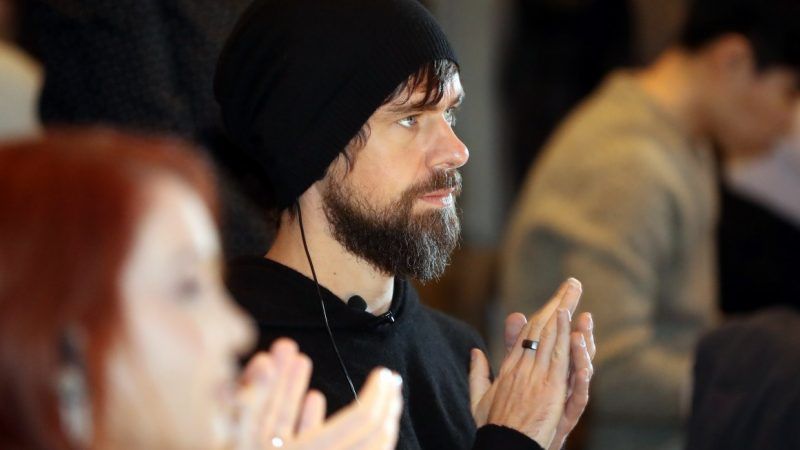Twitter's Ban on Political Ads Will Help Incumbent Politicians Maintain Power
Attacks and threats by elected officials lead to inevitable self-censorship.

On Wednesday, Twitter CEO Jack Dorsey announced a pending worldwide ban on paid advertisements from and about political candidates and issues.
The company is still hammering out the details, but the goal is clear: Twitter is going to deal with the growing outrage and calls for some sort of impossible system of "fact-checking" political advertisements by bowing out entirely.
Dorsey explained yesterday afternoon in a lengthy Twitter thread that starts with this one:
We've made the decision to stop all political advertising on Twitter globally. We believe political message reach should be earned, not bought. Why? A few reasons…????
— jack (@jack) October 30, 2019
He argues that political figures and issue groups "earn" their reach when people voluntarily decide to share or follow an account on Twitter: "Paying for reach removes that decision, forcing highly optimized and targeted political messages on people. We believe this decision should not be compromised by money." He says that allowing campaigns to target individuals with paid political advertising "brings significant risks to politics" and can be "used to influence votes to affect the lives of millions."
Let's get the most obvious response out of the way first: Twitter is a private platform and should be permitted to set up whatever rules it wants to run political ads or to ban them entirely. If Twitter wants to deal with all this controversy by bowing out, that's their right. They have no ethical or moral obligation to serve as a platform for political advertisements. This decision was preceded by Twitter's similar choice in France—when the country attempted to force the social media platform to report information about political ads, they refused to run them altogether.
That said, this hand-wringing about some sort of distorting impact of political advertisement is ignorant claptrap oblivious to America's long history of freewheeling (and often misleading) campaign advertisements in every communication form that existed prior to social media. Furthermore, the decision will make it harder for less connected candidates and political organizations to reach people in the first place.
Nobody really likes political ads. But they do serve important purposes to advance democracy, particularly for those challenging the status quo. Incumbent politicians have a massive advantage not just in money raised but the fact that they have years of "earned media" over the work they do. Incumbents are operating with a much higher level of name recognition among their constituencies. With very few exceptions (almost always very rich citizens), anybody who seeks to challenge incumbents or our more powerful political organizations starts off at a huge disadvantage.
For Dorsey to treat the reach of these politicians as something that just happened organically is to deliberately ignore that their power and control over government strongly incentivizes voters to be aware of what decisions their elected officials are making.
The ability to spend money to improve the reach of a candidate's message is not a corrupting influence on democracy—it's a powerful balancing tool that allows a challenger to let people know he or she exists in the first place. Democracy is improved when challengers to power have avenues to reach voters that aren't under the control of the government.
While it's true that advertising gives richer people (and incumbent politicians) a louder voice, it also serves as a megaphone for new challengers. And to be clear, to whatever extent that mass sharing of social media messages is contributing to the spread of "fake news," political advertisements are not really the problem. Twitter itself notes that the company made less than $3 million from political ads in 2018 (out of total revenue of more than $3 billion that year).
Twitter representatives insist that this is all about the "principles," even though the beneficiaries of this decision are incumbent and entrenched political players who have massive amounts of reach precisely because of how much power they wield.
And, of course, we cannot ignore the political context of this decision. Politicians on the left and the right want to push around social media platforms, treat them as public utilities, and either force them to ban messages the politicians disapprove of or force them to carry messages that the politicians support. While it may be Twitter's "choice" to self-censor political advertisements, we cannot ignore the politicians who are using their power to influence this decision.
Don't expect too much opposition to Twitter's decision from the movers and shakers of the political world. A spokesman for presidential candidate and former Vice President Joe Biden praised Twitter's decision over at CNN, saying "When faced with a choice between ad dollars and the integrity of our democracy, it is encouraging that, for once, revenue did not win out." That this decision will make it slightly harder for people with less recognition and access to media to maybe publicize some of Biden's failings? Well, that's just gravy.
Below, Reason TV on how dirty political ads are as old as American elections:


Show Comments (53)